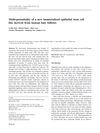 January 2022 in “Medical research archives”
January 2022 in “Medical research archives” Taking vitamin D might improve life for MS patients and reduce skin side effects from alemtuzumab treatment.
 3 citations,
October 2023 in “Military Medical Research/Military medical research”
3 citations,
October 2023 in “Military Medical Research/Military medical research” Regulatory T cells help heal skin and grow hair, and their absence can lead to healing issues and hair loss.
717 citations,
June 2010 in “Nature” Alopecia areata involves both innate and adaptive immunity, with specific genes linked to the disease.
 18 citations,
July 2022 in “Frontiers in Immunology”
18 citations,
July 2022 in “Frontiers in Immunology” Volatile organic compounds can cause inflammation and increase the risk of autoimmune diseases.
 May 2023 in “Frontiers in Immunology”
May 2023 in “Frontiers in Immunology” Treg cell-based therapies might help treat hair loss from alopecia areata, but more research is needed to confirm safety and effectiveness.
134 citations,
July 2020 in “Experimental dermatology” Hair follicles are normally protected from the immune system, but when this protection fails, it can cause hair loss in alopecia areata.
23 citations,
January 2016 in “Frontiers in immunology” Using low-dose IL-2 to increase regulatory T cells might be a safe way to treat type 1 diabetes without severe side effects.
 16 citations,
October 2023 in “Molecular cancer”
16 citations,
October 2023 in “Molecular cancer” New treatments like nanotechnology show promise in improving skin cancer therapy.
 3 citations,
December 2022 in “Cells”
3 citations,
December 2022 in “Cells” Cannabinoids like CBD and THC may help treat non-cancer skin diseases, but more research is needed.
2 citations,
December 2023 in “Pharmaceutics” Inhaling medicine may reduce side effects and improve treatment for a major lung cancer type.
 144 citations,
November 2020 in “Frontiers in immunology”
144 citations,
November 2020 in “Frontiers in immunology” Targeting the IL-23/IL-17 pathway effectively treats several inflammatory skin diseases.
 12 citations,
May 2017 in “Pharmacology & therapeutics”
12 citations,
May 2017 in “Pharmacology & therapeutics” Targeting immune tolerance issues in Alopecia Areata could restore hair growth and maintain remission.
 29 citations,
February 2018 in “European Journal of Immunology”
29 citations,
February 2018 in “European Journal of Immunology” Regulatory T cells are essential for normal and improved wound healing in mice.
143 citations,
January 2004 in “Journal of Investigative Dermatology Symposium Proceedings” Alopecia areata is an autoimmune disease causing hair loss, treatable with immune-modulating drugs, and linked to genetics.
 15 citations,
February 2017 in “Nursing Clinics of North America”
15 citations,
February 2017 in “Nursing Clinics of North America” Targeted cancer therapies can cause skin side effects, which should be treated early to help patients' quality of life and treatment adherence.
 34 citations,
June 2008 in “In vitro cellular & developmental biology. Animal”
34 citations,
June 2008 in “In vitro cellular & developmental biology. Animal” Scientists created a long-lasting stem cell line from human hair that can turn into different skin and hair cell types.
 11 citations,
November 2012 in “Seminars in Cutaneous Medicine and Surgery”
11 citations,
November 2012 in “Seminars in Cutaneous Medicine and Surgery” Genetic factors affect hair loss, and molecular testing may help predict, diagnose, and treat it.
 25 citations,
May 2018 in “Clinical & Translational Oncology”
25 citations,
May 2018 in “Clinical & Translational Oncology” New melanoma treatments can cause skin side effects, including skin cancer and rashes, but combining treatments may reduce these risks.
 1 citations,
October 2023 in “Life science alliance”
1 citations,
October 2023 in “Life science alliance” Pantethine may boost the immune system's ability to fight sarcoma.
 2 citations,
October 2015 in “Human Gene Therapy”
2 citations,
October 2015 in “Human Gene Therapy” The congress highlighted new gene therapy techniques and cell transplantation methods for treating diseases.
 July 2008 in “Biomedical Imaging and Intervention Journal”
July 2008 in “Biomedical Imaging and Intervention Journal” New cancer treatments are more precise and less toxic, improving survival rates, but Asia faces challenges in adopting these advancements.
278 citations,
May 2013 in “Ca” Targeted anticancer therapies can cause severe side effects similar to traditional chemotherapy, but with different types.
 24 citations,
January 2008 in “KARGER eBooks”
24 citations,
January 2008 in “KARGER eBooks” The document concludes that ongoing research using animal models is crucial for better understanding and treating Alopecia Areata.
 June 2024 in “Research Square (Research Square)”
June 2024 in “Research Square (Research Square)” Jagged-1 in skin Tregs is crucial for timely wound healing by recruiting specific immune cells.
 2 citations,
February 2018 in “InTech eBooks”
2 citations,
February 2018 in “InTech eBooks” TNF-alpha inhibitors can cause various immune-related skin issues.
 2 citations,
February 2014 in “Hair therapy & transplantation”
2 citations,
February 2014 in “Hair therapy & transplantation” Alopecia Areata is an autoimmune condition causing hair loss, influenced by genetics, environment, and possibly improved by anti-MIF therapy, with many patients experiencing regrowth within a year.
 35 citations,
May 2012 in “Expert Opinion on Pharmacotherapy”
35 citations,
May 2012 in “Expert Opinion on Pharmacotherapy” The document concludes that there are various treatments for different types of alopecia, but more research is needed for evidence-based treatments.
 2 citations,
March 2015 in “Expert opinion on orphan drugs”
2 citations,
March 2015 in “Expert opinion on orphan drugs” New treatments for hair loss show promise but need more research to confirm safety and effectiveness.
 148 citations,
December 2018 in “Journal of autoimmunity”
148 citations,
December 2018 in “Journal of autoimmunity” Alopecia areata is an autoimmune disease causing patchy hair loss, often with other autoimmune disorders, but its exact causes are unknown.
 January 2017 in “Springer eBooks”
January 2017 in “Springer eBooks” The document concludes that Cutaneous Lupus Erythematosus has different forms, is influenced by genetic and environmental factors, and can be treated with various medications, but more targeted therapies are needed.























